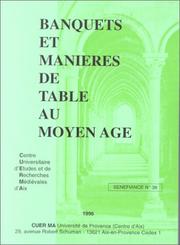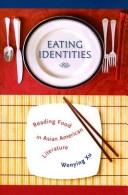| Listing 1 - 3 of 3 |
Sort by
|

ISBN: 2901104398 2821836929 9782901104391 Year: 1996 Volume: no 38 Publisher: Presses universitaires de Provence
Abstract | Keywords | Export | Availability | Bookmark
 Loading...
Loading...Choose an application
- Reference Manager
- EndNote
- RefWorks (Direct export to RefWorks)
History of civilization --- anno 500-1499 --- Dinners and dining --- Dinners and dining in literature. --- Food habits in literature. --- Gastronomy in literature. --- Repas --- Repas dans la littérature --- Habitudes alimentaires dans la littérature --- Gastronomie dans la littérature --- History. --- Histoire --- -Dinners and dining in literature --- Food habits in literature --- Gastronomy in literature --- Banquets --- Dining --- Eating --- Meals --- Caterers and catering --- Entertaining --- Etiquette --- Cooking --- Gastronomy --- Menus --- Table --- History --- Repas dans la littérature --- Habitudes alimentaires dans la littérature --- Gastronomie dans la littérature --- Dinners and dining in literature --- Dinners and dining - Europe - History. --- manières --- repas
Book

ISBN: 9782868205506 286820550X 9791034404933 Year: 2018 Volume: *5 Publisher: Strasbourg : Presses universitaires de Strasbourg,
Abstract | Keywords | Export | Availability | Bookmark
 Loading...
Loading...Choose an application
- Reference Manager
- EndNote
- RefWorks (Direct export to RefWorks)
Le xixe siècle, siècle de la gastronomie ? La Révolution qui lui donne naissance est, quoi qu'il en soit, également culinaire. Le Bourgeois s'empare de la table laissée vacante par l'Émigré, et fait du « ventre en majesté » l'indice de sa conquête sociale. Aiguillé par le nouveau discours gastronome et la diététique qui en découle, l'artiste - et en premier l'homme de lettres - semble quant à lui considérer sous un jour nouveau l'innutrition à l'origine de ses œuvres. Des Carnets de Joseph Joubert aux variations littéraires autour du Hungerkünstler, du Traité des excitants modernes de Balzac à la « gourmandise » salvatrice de Gide, l'art du xxie siècle interroge le lien entre rythme de la création et rythme de la nutrition. Parallèlement, la « physiologie du goût » inspire le discours critique, et fournit un nouveau paradigme pour dire le Beau en l'associant au Savoureux, louer ou disqualifier les œuvres en fonction de leur rapport à la nourriture. C'est cette « cuisine de l'œuvre » qu'abordent ici spécialistes de la littérature et historiens de l'art, en tentant de cerner un art de se nourrir où dialoguent discours esthétique, médical et politique.
French literature --- Gastronomy in literature --- Food in literature --- Littérature française --- Gastronomie dans la littérature --- Aliments dans la littérature --- History and criticism --- Congresses. --- Histoire et critique --- Congrès --- Littérature française --- Gastronomie dans la littérature --- Aliments dans la littérature --- Congrès --- Food in literature. --- French literature. --- Gastronomy in literature. --- Ernährung. --- Mahlzeit. --- Nahrung. --- Literatur. --- Französisch. --- 1800 - 1899 --- Langue d'Oil --- Französische Sprache --- Galloromanisch --- Belletristik --- Dichtung --- Schöne Literatur --- Sprachkunst --- Wortkunst --- Buch --- Schriftsteller --- Ernährung --- Mahl --- Speise --- Nutrition --- Ernährungsstatus --- Ernährungszustand --- Lebensmittel --- Nahrung --- Ernährungsstatus --- Ernährungszustand --- Ernährung --- littérature --- cuisine --- histoire de l’art --- XIXe siècle

ISBN: 0824862287 1435666771 0824878434 0824831950 Year: 2007 Publisher: Honolulu University of Hawai'i Press
Abstract | Keywords | Export | Availability | Bookmark
 Loading...
Loading...Choose an application
- Reference Manager
- EndNote
- RefWorks (Direct export to RefWorks)
The French epicure and gastronome Brillat-Savarin declared, "Tell me what you eat, and I will tell you who you are." Wenying Xu infuses this notion with cultural-political energy by extending it to an ethnic group known for its cuisines: Asian Americans. She begins with the general argument that eating is a means of becoming—not simply in the sense of nourishment but more importantly of what we choose to eat, what we can afford to eat, what we secretly crave but are ashamed to eat in front of others, and how we eat. Food, as the most significant medium of traffic between the inside and outside of our bodies, organizes, signifies, and legitimates our sense of self and distinguishes us from others, who practice different food ways. Narrowing her scope, Xu reveals how cooking, eating, and food fashion Asian American identities in terms of race/ethnicity, gender, class, diaspora, and sexuality. She provides lucid and informed interpretations of seven Asian American writers (John Okada, Joy Kogawa, Frank Chin, Li-Young Lee, David Wong Louie, Mei Ng, and Monique Truong) and places these identity issues in the fascinating spaces of food, hunger, consumption, appetite, desire, and orality. Asian American literature abounds in culinary metaphors and references, but few scholars have made sense of them in a meaningful way. Most literary critics perceive alimentary references as narrative strategies or part of the background; Xu takes food as the central site of cultural and political struggles waged in the seemingly private domain of desire in the lives of Asian Americans. Eating Identities is the first book to link food to a wide range of Asian American concerns such as race and sexuality. Unlike most sociological studies, which center on empirical analyses of the relationship between food and society, it focuses on how food practices influence psychological and ontological formations and thus contributes significantly to the growing field of food studies. For students of literature, this tantalizing work offers an illuminating lesson on how to read the multivalent meanings of food and eating in literary texts.
American literature --- Gastronomy in literature. --- Food habits in literature. --- Dinners and dining in literature. --- Cooking in literature. --- Asian Americans --- Asian Americans in literature. --- Food habits --- Asian American authors --- History and criticism. --- Intellectual life. --- Social aspects. --- Cookery in literature --- Asians --- Ethnology --- Literature --- Ethnic group --- Masculinity
| Listing 1 - 3 of 3 |
Sort by
|

 Search
Search Feedback
Feedback About
About Help
Help News
News